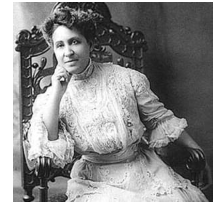Mary Church Terrell was born Mary Eliza Church on September 23, 1863, in Memphis, Tennessee. Her parents, Robert Reed Church and Louisa Ayers, were both former slaves who became small business owners and a vital part of Memphis’ growing black population. Her father became one of the South’s first African-American millionaires; her mother owned a beauty salon.
Terrell and her brother were taught the values of a good education, hard work and ambition. Using the lessons learned, she went on to Oberlin College, becoming one of the first African-American women to earn a college degree, and then to earn her master’s degree in education.
She taught for two years at Wilburforce College before moving to Washington, DC, to teach at the M Street Colored High School in 1887. It was there that she met Robert Heberton Terrell. They were married in 1891. The Terrells had one daughter and adopted another.
In 1892, when her friend, Thomas Moss, was lynched by whites in Memphis because his business competed with theirs, Terrell joined Ida B. Wells-Barnett in anti-lynching campaigns. She also became involved in the suffrage movement because she understood she belonged “to the only group in the country that has two huge obstacles to surmount…both sex and race.
She actively campaigned for women’s suffrage and for black women’s suffrage. She both spoke and wrote tirelessly to black organizations and mainstream white organizations about suffrage and civil rights. She even picketed the White House with members of the National Woman’s Party.
Among her accomplishments were:
• Co-founder of the National Association of Colored Women (NACW).
• President of NACW from 1896 to 1901.
• A founder and charter member of the National Association for the Advancement of Colored People.
• Co-founder of the College Alumnae Club (later renamed the National Association of University Women).
• Author of her autobiography, “A Colored Woman In A White World”.
• The first African-American woman ever appointed to a school board.
• Served on a committee that investigated police mistreatment of African-Americans.
When, at 86, Terrell was refused service at the John R. Thompson restaurant in Washington, DC, she challenged segregation in public places. In 1953 the Supreme Court ruled that segregation in eating facilities was unconstitutional. She was victorious!
Terrell died in 1954 in Highland Beach, Maryland. She left a remarkable legacy of service to women, both black and white, and to African-Americans.
**
